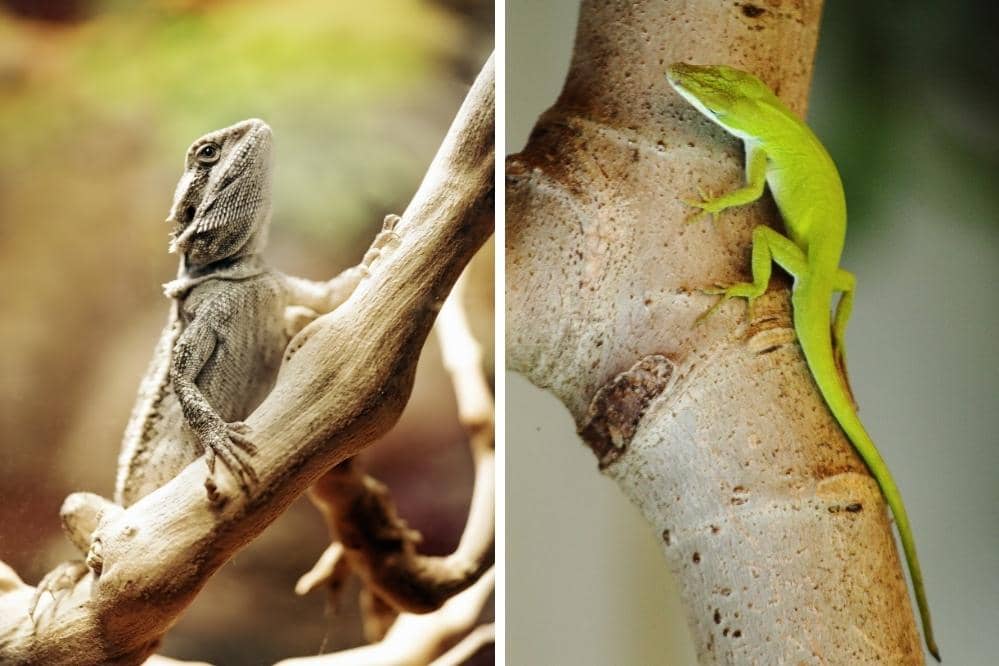Usually, bearded dragons are known to make a good pet and are considered perfect for newbies and families with children. However, not many reptiles can be maintained with bearded dragons inside the same vivarium. This is because bearded dragons are so solitary and territorial instinctively that they even don’t share their place with other beardies.
As far as the question of keeping an anole lizard with a bearded dragon is concerned, it doesn’t seem to be a good idea. Though the habitat requirements (temperature, type of substrate and accessories, light duration and intensity, humidity etc.) of anole lizards are same as bearded dragons, the territorial natures of beardies make it near to impossible idea to keep both reptiles together. Because, after all, anoles are very small (though they are aggressive and territorial, too), and can’t afford a fight with an intensely territorial reptile like a bearded dragon.
Can Bearded Dragons Eat Anoles?
Unfortunately, the answer is yes; in fact, this is one of the reasons why experts don’t recommend keeping anole with the bearded dragons in the same vivarium. In the wild, bearded dragons usually survive by eating insects, vegetables, fruits and small lizards (including anoles). So if you keep them together in captivity, your little anole is expected to disappear shortly. In addition, eating anole can lead to many health issues in bearded dragons.
Risks For Bearded Dragons Associated With Eating Anoles
Though in the wild, bearded dragons may frequently eat anoles, and this could be a reason for the shorter life span of wild beardies as compared to bearded dragons in captivity. However, nature has its own food chain system to help every specie survive.
In captivity we can’t afford to feed anoles to our bearded dragons in captivity due to the following risks.
1. Territorial Conflict And Injuries
Like bearded dragons, anoles are also territorial to some extent, and when you put them in beardie’s tanks as food, anoles will fight, not only because they are forced by territorial instinct but also for survival. Though anole is not likely to win the battle, he may badly injure bearded dragon during the process. This is especially more dangerous for beardies, who are bred in captivity and grew up eating tiny insects. Because such bearded dragons don’t have any experience fighting or hunting aggressive prey like anoles and likely to get injured more severely.
2. Parasites and Pesticides
The major risk associated with eating anole is parasites. Anoles usually carry a lot of parasites (including salmonella) that will be transmitted to the beardie eating it. These parasites, especially salmonella can be life threatening. In addition, anole may have some residues of pesticides or herbicides that can be detrimental to beardies.
Related article What are signs of sickness in bearded dragons?
3. Choking
Generally, reptile experts advise that whatever food you offer your bearded friend in captivity, its size should be less than the space between beardie’s eyes. Therefore, insects, finely chopped veggies, or fruits are considered the best options to feed your bearded dragon. Anoles generally don’t meet this rule as they are a bit larger, so beardie may find it difficult to swallow these lizards and choke easily.
What To Do If Your Bearded Dragon Eats An Anole?
Though bearded dragons in the wild frequently come across anole, it is not their first option because bearded dragons may have to struggle for duration ranging from mere few minutes or hours to catch them. In addition, these lizard fights and can injure beardies. So beardies in the wild prefer small insects and will not go for anole unless the food resources are very scarce. Similarly, in captivity, there is no possibility for a bearded dragon to eat an anole unless you offer them an anole to eat. However, your bearded friend may eat an anole (or other small lizards) while venturing outside their tank, and in such case, you may have to face any of the following possible scenarios.
The first scenario – Nothing happens during the next few days. Though this will happen rarely, it is still considered possible outcome because bearded dragons can digest anole without any problem as they do in the wild.
The Second scenario – Anole will be digested without any problem but your beardie may get some wounds or injuries while hunting anole. Wounds can be anywhere on body, externally or inside the mouth.
The Third scenario Bearded dragon may experience from mild to life threatening digestive disturbance such as abdominal pain, diarrhea etc.
Whatever the case may be, if you suspect your bearded friend has eaten an anole, the first thing to do is to check his body for wounds and apply antiseptic medicine if necessary. The second step is not to wait for anything bad to happen and take your beardie to the vet. The vet will examine thoroughly, may perform some tests to check for parasites and prescribe medication if necessary. A timely vet visit is crucial because certain health issues can be life-threatening if delayed.
Common Controversy (What To Feed)
Many owners insist that what bearded dragons eat in the wild should be replicated in captivity. Though the statement is technically true, we are supposed to give the best diet to our reptile pets in captivity. At this point, you must keep three things in mind:
- First, as we mentioned earlier, anole is not the first choice of bearded dragons, even in the wild.
- Second, these small lizards are not very nutritious, and beardies will hardly get any benefit from eating an anole, even if they digest them without any issue.
- Third, anoles are aggressive and will fight for their lives and gravely injure your bearded reptile.
So why not go for the feeding options that are more nutritious, easy to hunt or capture and don’t cause any injuries or health issues, like insects, vegetables and fruits. Even beardies in the wild prefer insects, vegetables and fruits over anoles. However, every insect, fruit or vegetable is not safe for beaded dragons, and you should know what insects, vegetables and fruits you can feed and what you can’t feed to your bearded friends.

